 Petzlover
Petzlover Both American Bobtail and Chantilly/Tiffany are originated from United States. Both American Bobtail and Chantilly/Tiffany are having almost same weight. American Bobtail may live 4 years more than Chantilly/Tiffany. Both American Bobtail and Chantilly/Tiffany has same litter size. American Bobtail requires Moderate Maintenance. But Chantilly/Tiffany requires Low Maintenance
Both American Bobtail and Chantilly/Tiffany are originated from United States. Both American Bobtail and Chantilly/Tiffany are having almost same weight. American Bobtail may live 4 years more than Chantilly/Tiffany. Both American Bobtail and Chantilly/Tiffany has same litter size. American Bobtail requires Moderate Maintenance. But Chantilly/Tiffany requires Low Maintenance
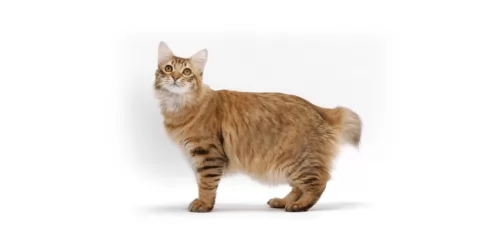 Bobtailed cats have a naturally shortened tail due to natural genetic mutation. The cat’s original appearance genetics were modified so as to bring about an improved strain that comes in all colors and coat types.
Bobtailed cats have a naturally shortened tail due to natural genetic mutation. The cat’s original appearance genetics were modified so as to bring about an improved strain that comes in all colors and coat types.
The cat descended from a short-tailed kitten, Yodi. His kittens also had a short tail. Two women selectively bred the cats to be large and strong with a wild look but with a pleasant nature.
The cats used in the development of the breed were domestic shorthairs and longhairs. They are now pedigreed cats without tails.
In 1989, the International Cat Association accepted the American Bobtail into its new breed category, giving it full recognition in 2002. They were accepted for registration by the Cat Fanciers’ Association in 2000. This is the world's biggest registry of pedigreed cats.
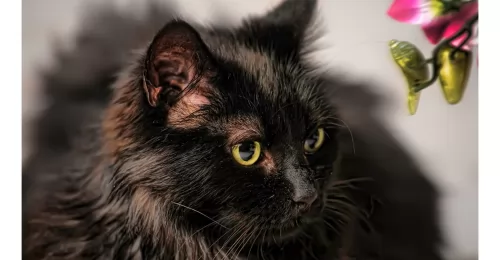 The beautiful Chantilly/Tiffany cat gets people thinking the cat is a semi-longhaired Burmese, but of course, it's not.
The beautiful Chantilly/Tiffany cat gets people thinking the cat is a semi-longhaired Burmese, but of course, it's not.
The way the Chantilly came about was that there were a pair of chocolate-colored cats but their origins were unknown. The first litter of Chantilly kittens was born in New York in 1969 and people were so taken up by the beautiful kittens that a breeding program was started.
The cat was first started as a foreign longhair and then it changed to Tiffany. In a British registry, a cat breed that was a cross between a Chinchilla Persian and a Burmese was named the Tiffanie and renamed Chantilly and referred to as the Chantilly/Tiffany.
The breed is recognized by most major cat registries.
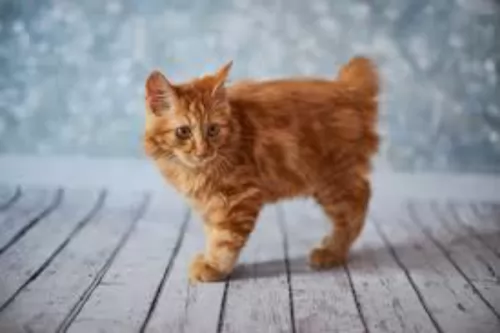 The American Bobtail is a cat that came about in the 1960s. It is well know as the cat with a bobbed tail. It’s not as vocal as many other cat breeds. It’s not a slender cat but is sturdy and and strong weighing between 3 and 7kg. Their double coats can be short- or long-haired. The coat comes in different patterns and colors, including orange, cream, black, brown, chocolate etc with a shaggy texture. He sheds quite a bit. The body of the American Bobtail is faily long. Its ears are medium-sized and wide-based with rounded tips, the eyes are almond shape. The eyes can be gold, yellow, green or blue. What is interesting is that the hind legs are much longer than the fore legs, and the feet are round.
The American Bobtail is a cat that came about in the 1960s. It is well know as the cat with a bobbed tail. It’s not as vocal as many other cat breeds. It’s not a slender cat but is sturdy and and strong weighing between 3 and 7kg. Their double coats can be short- or long-haired. The coat comes in different patterns and colors, including orange, cream, black, brown, chocolate etc with a shaggy texture. He sheds quite a bit. The body of the American Bobtail is faily long. Its ears are medium-sized and wide-based with rounded tips, the eyes are almond shape. The eyes can be gold, yellow, green or blue. What is interesting is that the hind legs are much longer than the fore legs, and the feet are round.
Bobtails are friendly cats, enjoying being in the company of their human family as well as with strangers. They are loving and affectionate to the entire family as opposed to just one person.
They’re quiet cats but will chirp when happy and excited. They get on well with all members of their human family and that includes children and the dogs.
They’re intelligent cats too and they can be taught to walk on a leash and to also perform some tricks. There are some people who say that their Bobtails act more like dogs than cats. These cats are sensitive and can sense when their owners are happy or sad and will come and sit with you when you're feeling sad and alone.
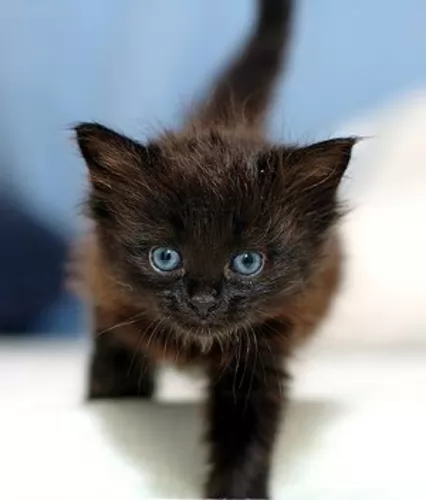 The cat has a fairly broad head with widely spaced ears of medium size. The eyes are oval-shaped and gold in color. The fur is semi-long and there is no undercoat. The tail is plumed.
The cat has a fairly broad head with widely spaced ears of medium size. The eyes are oval-shaped and gold in color. The fur is semi-long and there is no undercoat. The tail is plumed.
Apart from the original chocolate brown of the cat, other colors of the coat can include fawn, cinnamon, black, lilac and blue, with the chocolate brown being the favorite color.
The Chantilly promises to be a devoted and loyal feline companion for you, much preferring the company of his human family than to being alone.
It gets on well with other pets in the house as well as with respectful, gentle children. He isn't a demanding cat and he tries to talk with his family by chirping. It’s a balanced cat, with a fair share of docility and energy, making the cat an ideal companion for single people, couples, families, and elderly people.
It’s a cat that is so devoted, it will follow his human family around the house.
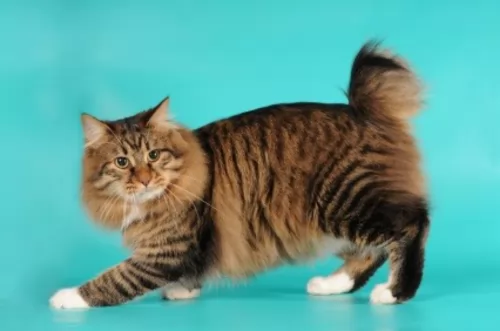 Many people want a dog as a pet but aren’t able to keep one and then the American Bobtail becomes the ideal alternative. These cats aren’t known for their solitary personalities like the many other cats there are and they genuinely love to spend time with their human family. Some will even behave like a dog and be there to meet you at the door when you arrive home.
Many people want a dog as a pet but aren’t able to keep one and then the American Bobtail becomes the ideal alternative. These cats aren’t known for their solitary personalities like the many other cats there are and they genuinely love to spend time with their human family. Some will even behave like a dog and be there to meet you at the door when you arrive home.
He is a fairly large, amicable cat and is affectionate and adaptable to your lifestyle. He enjoys all kinds of lifestyles and loves to curl up next to you on your travels, being the perfect road trip companion.
The American Bobtail is a therapeutic cat and is sensitive to the moods of its human family. He gets on well with children and other pets in the family and just wants to be a family member.
By bringing an American Bobtail into your home and your heart, you’ll have discovered the most wonderful feline companion there is.
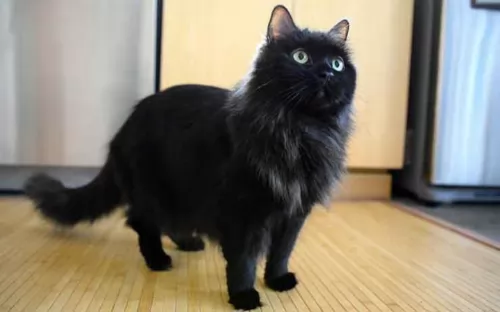 The Chantilly/Tiffany is a gentle and kind breed that is playful and easy-going. They are just your typical middle-of-the-road cats that are not too much or too little of anything.
The Chantilly/Tiffany is a gentle and kind breed that is playful and easy-going. They are just your typical middle-of-the-road cats that are not too much or too little of anything.
The Tiffany is playful, docile, happy and content and he wants to be your friend and companion.
If you are looking for a breed of cat that is loyal to its human family, allow this cat into your home... you won't have any regrets.
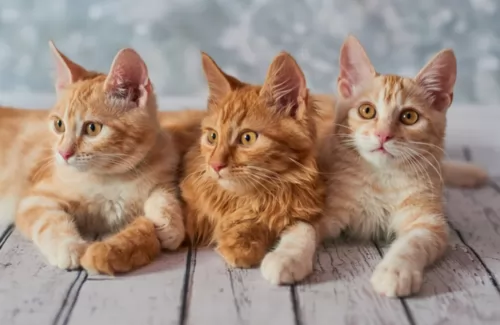 When you buy a kitten from a breeder, always do research on the breeder so as to avoid a host of health issues down the line.
When you buy a kitten from a breeder, always do research on the breeder so as to avoid a host of health issues down the line.
Apart from the typical cat health problems, the Bobtail is a healthy breed of cat. With proper care from you at home as well as veterinary care, these interesting looking cats can live up to anything between 12 and 20 years.
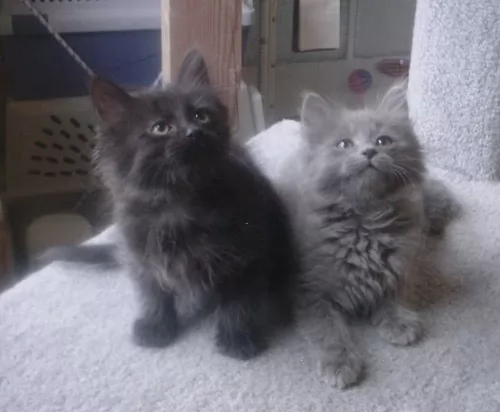 There is no health issue that the Tiffany is prone to. Like any cat, a healthy diet will keep the Tiffany healthy for years.
There is no health issue that the Tiffany is prone to. Like any cat, a healthy diet will keep the Tiffany healthy for years.
These cats are known to have delicate digestive systems so avoid foods with grain if possible. The Tiffany has full hair in their ears, and wax build-up can occur so the inside of his ears must be checked. Checking the ears once a week, as part of a regular routine that includes brushing, and tooth care, should be sufficient to keep the ear canals clear.
Other issues, which are not detrimental but should be kept in mind, are reports that the Tiffany has delicate digestion. This cat relies on a regular diet that doesn't chop and change often.
Because the Tiffany is a low-shedding cat, it is thought to be a popular breed with those people who are allergic to cat hair.
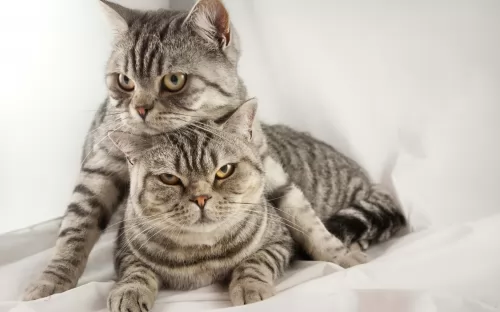 Keep a close eye on your cat’s weight.
Keep a close eye on your cat’s weight.
Keep the litter box of your Bobtail scrupulously clean.
Your American Bobtail needs the best quality food there is full of vitamins and minerals if he is to remain healthy. The cat’s diet will depend a lot on his activity levels and general health, but it should always be high protein food. Your vet will always help you with some guidelines on feeding your cat.
Every cat needs exercise, and even though these cats aren’t as energetic as other cats, they are active indoors and out and are also playful. You will need to provide it with some puzzle toys and a climbing tree to keep him mentally and physically active.
Brush his medium-length fur twice a week to keep it shiny and silky.
Trim his nails carefully and check his eyes and inside his ears for abnormal discharges.
Vaccinate your cat to keep it protected from life-threatening cat diseases and take him to the vet immediately you suspect something is wrong.
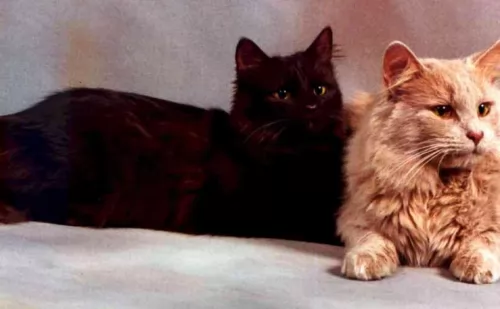 The Chantilly needs an excellet diet and exercise to ensure he doesn’t become to overweght. Remember that cats are carnivores, and this means they have nutritional requirements that can only be met with meat – they can never do well on a diet high in carbohydrates and will develop digestive problems. Your cat will also require clean, fresh water aroud thd clock to ensure his good health.
The Chantilly needs an excellet diet and exercise to ensure he doesn’t become to overweght. Remember that cats are carnivores, and this means they have nutritional requirements that can only be met with meat – they can never do well on a diet high in carbohydrates and will develop digestive problems. Your cat will also require clean, fresh water aroud thd clock to ensure his good health.
Ensure each cat you have has a litter box andencourae good litter box habits by cleaning th litter box every day. Keeping the litter box clean also alerts you anything unusual with your cat’s toilet habits.
Provide your cat with a scratching post and a climbing tree.
The cat doesn’t have an undercoat and is therefore easy to groom. With his semi-long hair, you can brush him once a week to keep the coat soft and shiny. The coat is also low shedding.
Check inside his ears and inside his mouth to ensure there is no redness and signs of infection.
Schedule regular vet visits for your cat for his cat vaccines and for when he is sick.
Spay or neuter your cat to prevent unwanted kittens. Spaying and neutering prevents uterine infections and certain cancers in the felines.